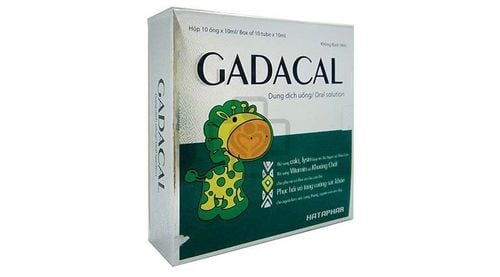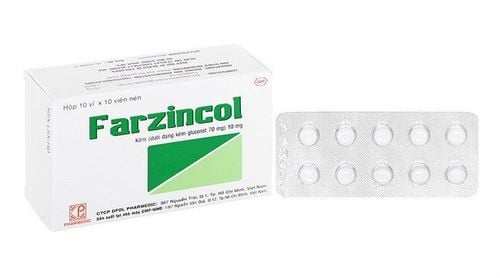This is an automatically translated article.
The article was professionally consulted by Specialist Doctor II Tran Thi Linh Chi - Head of Pediatrics - Neonatology Department - Vinmec Hai Phong International General HospitalThe trace element zinc is essential for our living organism and biological processes. Zinc plays an important role in the activity of more than 300 enzymes and is involved in the proliferation, differentiation and survival of cells.
1. The trace element zinc plays an important role in the living organism
Zinc is a trace element necessary for living organisms and biological processes. The body cannot accumulate zinc, so it is necessary to obtain trace amounts of zinc from the diet. Although the amount of zinc available in the diet is constantly changing, cells need to maintain the homeostasis of the trace element zinc within the cells to ensure normal function.Zinc is the second most abundantly distributed trace element in the body after iron. Zinc is found in many foods, such as beef, poultry, seafood, and whole grains. Commercially available zinc supplements contain 7 to 80 mg of elemental zinc, usually formulated as zinc oxide or salt with acetate, gluconate, and sulfate. Multivitamin tablets usually contain 7.5 to 15 mg of elemental zinc. Zinc plays an important structural role or acts as a catalyst for more than 300 enzymes and is involved in all levels of cell signaling. Zinc is involved in cell communication, proliferation, differentiation and cell survival. Therefore, zinc plays an important role in the regulation of the immune system.
The understanding of the importance of zinc to human health only began in the 1960s, zinc deficiency has been linked to a decline in the immune system with chronic inflammation.
Symptoms of zinc deficiency include growth retardation, growth retardation, male hypogonadism, skin disease, nail dystrophy, impaired taste and smell, impaired immunity and resistance infection.

Nguyên tố vi lượng kẽm cần thiết cho sự phát triển của trẻ
2. What effect does zinc have?
In developing countries, zinc supplementation may be effective in preventing upper respiratory tract infections and diarrhea. Zinc as an adjunct in the treatment of diarrhea has been included in the treatment regimen especially in malnourished children. Zinc deficiency is associated with delayed wound healing. Zinc is a common ingredient in topical products used to treat skin conditions such as ulcers, diaper rash, and hemorrhoids; Zinc deficiency is associated with rapid progression of HIV; Zinc has antioxidant properties and may protect against age-related oxidative stress macular degeneration; Zinc is an effective treatment for Wilson's disease: Wilson's disease can be successfully treated with zinc because of its ability to compete with copper for binding sites. Zinc acetate has been shown to be effective in the long-term treatment of Wilson's disease and is approved by the US Food and Drug Administration for maintenance treatment. As such, zinc supplements are commonly used to alleviate a number of conditions including zinc deficiency, diarrhea, age-related macular degeneration, upper respiratory tract infections (URIs), wound healing, and more. and human immunodeficiency virus (HIV)...Adverse effects of long-term use of high doses of zinc include suppressed immunity, decreased levels of high-density lipoprotein cholesterol, anemia, copper deficiency.

Nguyên tố vi lượng kẽm như một biện pháp hỗ trợ điều trị tiêu chảy ở trẻ em suy dinh dưỡng
3. Notes when supplementing with trace zinc
Some undesirable effects when supplementing with trace elements zinc:
Metallic taste; Nausea, vomiting; Abdominal cramps; Diarrhea; The immune system may be suppressed; Lowers the level of good cholesterol HDL; Reduces copper stores in the body; Urinary tract infections ; Formation of kidney stones. In addition, zinc can inhibit the absorption of some penicillins, tetracyclines and quinolones. Iron and phytate supplements (common in grains and legumes) can inhibit the absorption of the trace element zinc, so users should take these products at least 2 hours apart from each other. with zinc supplementation.
Dosage of trace element zinc :
Recommended dietary intake for zinc ranges from 2 mg/day in young children to 9 mg/day in adolescent girls and 11 mg/day in men adult. Requirements are slightly higher during pregnancy and lactation.
Increasing the dose of zinc may compete with the intestinal absorption of Copper, the risk of copper deficiency
In children, zinc deficiency due to insufficient oral zinc supplementation is usually 1 to 2 mg/kg/day elemental zinc. The duration of supplementation should be 4-6 weeks, depending on the etiology and severity. In some cases, it is necessary to control copper in the blood to ensure that copper deficiency is not caused.
These alternative doses are also appropriate for patients with underlying conditions of zinc deficiency, such as Crohn's disease, cystic fibrosis, liver disease, or sickle cell disease. For some diseases such as atopic dermatitis, the therapeutic dose of zinc may be higher.
It is recommended that when supplementing with zinc, blood zinc levels should be measured every 3-6 months and supplement dose adjusted as necessary. In addition, to slow the progression of age-related macular degeneration, patients should use 80 mg of elemental zinc combined with 2 mg of copper, 500 mg of vitamin C, 400 IU of vitamin E and 15 mg of beta-carotene per day.
For more nutritional knowledge and child care for each age, parents should regularly visit the website vimec.com and make an appointment with the leading doctors, pediatric and nutrition experts of the National General Hospital. Vinmec when needing advice on children's health.
References: pubmed.ncbi.nlm.nih.gov, ncbi.nlm.nih.gov, uptodate.com














